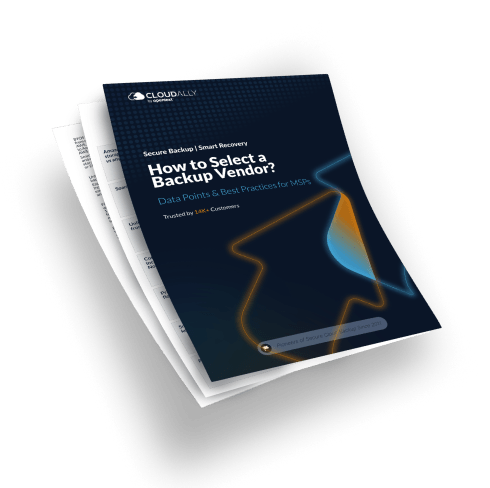Cloud Storage: From Basics to Best Practices
Cloud storage refers to the online space where data is stored, managed, and backed up remotely. This means that data can be accessed from anywhere with an internet connection, making it convenient and versatile for businesses and individuals alike. In this glossary article we will do a deep dive of cloud based storage including the definition, advantages, pointers to select the best cloud storage, and a comparison of the top four best cloud storage services.
What is Cloud Storage?
Cloud storage is a method of storing data on remote servers that can be accessed through the internet. This means that instead of saving files on your computer’s hard drive, they are stored in a remote location, making them accessible from any device with an internet connection. There are many different types of cloud storage services available, like Google Drive, Microsoft OneDrive, Dropbox, and Box. Each service offers its own set of features and pricing plans, but the overall concept remains the same – storing and managing data in the cloud.
Advantages of Cloud Storage
- Accessibility: One of the main advantages of cloud storage is being able to access your files from anywhere with an internet connection. This eliminates the need for carrying around external hard drives or USBs, making it convenient for individuals and businesses.
- Cost-Effective: Compared to traditional methods of storing data, cloud storage is much more cost-effective. Instead of investing in expensive hardware and software, you only pay for the amount of storage space you need.
- Collaboration Made Easy: With cloud storage, multiple users can access and collaborate on the same files. This is especially useful for businesses with remote teams or employees who need to work together on projects.
- Security: Cloud storage services have advanced security measures in place to protect your data from cyber threats and unauthorized access. It also ensures that your data is not lost or compromised due to physical damage, theft, or natural disasters.
- Scalability: As your storage needs grow, cloud storage can easily scale up to accommodate them. You do not have to worry about upgrading hardware or running out of space, as you can simply increase your storage plan with a few clicks.
- Automated Software Updates: With traditional methods of storing data, software updates often require manual installation and maintenance. With cloud storage, updates are automatically applied by the service provider, freeing up your time and resources for other important tasks.
- Disaster Recovery: In the event of a system failure or disaster, cloud storage provides a reliable backup option to restore your data quickly. This ensures minimal downtime and enables you to get back to work as soon as possible.
- Cost Savings: With traditional methods of data storage, businesses often have to invest in expensive hardware and maintenance costs. Cloud storage eliminates these expenses, allowing businesses to only pay for the amount of storage they need. This can result in significant cost savings over time.
Top Cloud Storage Providers
- Amazon Web Services (AWS) S3: A popular choice for businesses and developers offering scalable and secure object storage.
- Google Cloud Storage: Part of Google Cloud Platform, offering storage solutions with integration into Google’s ecosystem.
- Microsoft OneDrive: Integrated with Microsoft Office 365, providing cloud storage and collaboration tools.
- Dropbox: Known for its user-friendly interface and file-sharing capabilities.
- Box: Focused on secure file sharing and collaboration for businesses.
- Apple iCloud: Integrated with Apple devices, offering storage and synchronization for photos, documents, and more.
- Backblaze B2: Known for its simplicity and cost-effective storage solutions for businesses and developers.
Steps to Implement Cloud Storage
- Identify Your Storage Needs: Before choosing a cloud storage provider, it’s important to determine your storage needs. Consider factors such as data size, file types, and access requirements.
- Research Different Cloud Storage Providers: There are various options available in the market for cloud storage providers. Research each one carefully to find the best fit for your business or development needs.
- Compare Features and Pricing: Each provider offers different features and pricing plans. It’s essential to compare them to ensure you choose the most cost-effective option that meets your requirements.
- Set Up Your Account: After selecting a provider, create an account and set up your preferred payment method.
- Configure Storage Settings: Once your account is set up, configure your storage settings. This includes selecting the type of storage (i.e., block, file, or object), storage capacity, and any necessary security measures.
- Migrate Your Data: After configuring your storage settings, it’s time to migrate your data to the cloud. Most providers offer tools or services to help with this process.
- Test and Monitor: Before fully committing to a cloud storage solution, run tests to ensure that everything is functioning correctly. It’s also crucial to monitor your data regularly for any issues or potential security threats.
- Integrate with Other Applications: Cloud storage can seamlessly integrate with other applications such as file sharing platforms or project management tools. Take advantage of these integrations to streamline your workflow and increase efficiency.
- Implement Backup and Disaster Recovery Plans: While cloud storage providers have robust security measures in place, it’s always wise to have a backup and disaster recovery plan in case of any unexpected situations. Make sure to regularly backup your data and have a plan in place for quick recovery if needed.
- Train Your Team: Lastly, it’s essential to educate your team on best practices for using cloud storage. This includes proper data management, security protocols, and how to access and share files effectively. By training your employees, you can ensure that they are using the cloud storage solution efficiently and securely.
How to Pick the Best Cloud Storage Provider
In this blog post, we compare the top 4 best cloud storage providers Google Drive Vs. OneDrive Vs. Dropbox Vs. Box. We compare them across the following parameters:
- File Sharing and Collaboration Capabilities
- Ease of Synchronization
- Ecosystem and Integration
- Pricing
After examining the points above, list your stakeholder’s expectations from the cloud storage and analyze how the cloud storage fares vis-à-vis the requirements. Understand the aspects of cloud storage spanning file sharing and collaboration, file synchronization, and pricing, and map it to your organization’s needs.
Secure All Cloud Storage With CloudAlly
What’s the common factor between the top four best cloud storage services – Microsoft 365, Google Workspace, Dropbox, and Box? None of them provide the option for unlimited point-in-time recovery from data loss, despite their impressive functionality and features. SaaS data loss occurs frequently, affecting one in three organizations. To ensure the safety of your business-critical data on the cloud storage, it is paramount to safeguard it against accidental deletions, malware, ransomware, phishing scams, sync errors, and any malicious intent. Only cloud-to-cloud backup and recovery can eliminate the risk of cloud storage data loss. Secure your cloud storage with a disaster recovery plan and a reliable third-party backup solution. CloudAlly is the only secure backup and recovery solution that backs up data from all SaaS platforms – Microsoft 365, Google Workspace, Dropbox, and Box (and Salesforce for good measure). So you can backup and recover all your cloud storage data with one single tool, with a unified view and an intuitive dashboard.
Start a free CloudAlly trial and secure all your data on cloud storage!










